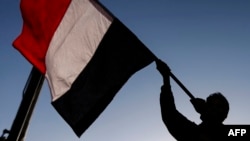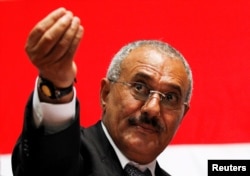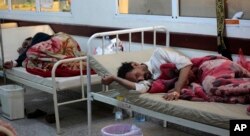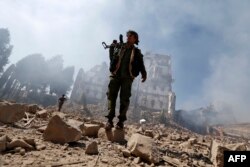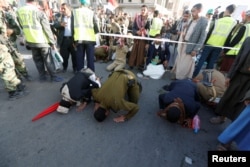The United States has joined the United Nations in urging all sides in Yemen to refrain from violence and restart political talks to end the civil war, amid worries that tensions may escalate after rebels killed the country's former president and their former ally, Ali Abdullah Saleh.
"We are incredibly concerned about the violence there," said State Department spokesperson Heather Nauert on Tuesday during a briefing.
A State Department official told VOA the U.S. is urging all parties in Yemen to stop fighting and not invoke the killing of Saleh to escalate the conflict.
"All sides must end the fighting and return to U.N.-mediated negotiations toward a comprehensive political agreement," said the official.
Saleh was killed by the Iran-aligned Houthi rebels after switching sides in the civil war. He had broken with the pro-Iranian militia group last Saturday by offering to negotiate with the Saudi-led coalition.
Following Saleh's death, his son Ahmed Ali vowed to lead a campaign against the Houthis.
In a statement, Ali said that he would "confront the enemies of the homeland and humanity, who are trying to obliterate its identity and its gains and to humiliate Yemen and Yemenis."
In New York, the United Nations Security Council called Tuesday on all sides in Yemen to "de-escalate, to recommit and re-engage without preconditions" in a U.N.-led political process to achieve a durable cease-fire.
Humanitarian dangers
Yemen's civil war sparked a humanitarian crisis.
After U.N. Special Envoy for Yemen Ismail Ould Cheikh Ahmed briefed the Security Council during a closed-door meeting, Japanese ambassador to the U.N. and Security Council President for December, Koro Bessho, said, "Yemen stands on the brink of catastrophic famine" with "8 million people facing extreme food shortages and suspected cholera cases at over 970,000."
The United Nations says millions of people may die in one of the worst famines of modern times, as warring parties block food supplies.
"The latest developments in Yemen create a period of maximal risk, a zone of all dangers both on the humanitarian and military front," said France's Permanent Representative to the United Nations Francois Delattre on Tuesday. "Our first priority is to silence weapons and to allow a complete and immediate humanitarian access on all Yemen and via all its ports and airports."
Britain's Deputy Ambassador to the U.N. Jonathan Allen said the escalation in fighting "couldn't have come at the worse time for the people of Yemen."
"We need humanitarian access, we need commercial access and this is critical," according to Allen.
U.N. spokesman Stephane Dujarric earlier told reporters the death of former President Saleh "adds an extreme level of complexity to already a very difficult political situation." Dujarric said the world body stands ready to broker a negotiated halt to the conflict that has left 10,000 people dead and millions in desperate need of humanitarian aid in Yemen since 2014.
Streets as battlegrounds
The U.N. humanitarian coordinator for Yemen, Jamie McGoldrick, called for a humanitarian cease-fire on Tuesday to allow civilians to seek assistance. "The streets of Sana'a city have become battlegrounds and people are trapped in their homes, unable to move out in search of safety and medical care and to access basic supplies such as food, fuel and safe water."
Saleh ruled Yemen for more than three decades before he was ousted under popular and political pressure in 2012, but continued to wield power behind the scenes, forming an alliance with the Iran-backed Houthis as they seized control of Sana'a in 2014 and forced President Abdu Rabu Mansour Hadi into exile.
Arab League chief Abul Gheit warned Tuesday that Saleh's killing could bring an "explosion in the security situation in Yemen."
Saleh's death Monday capped a dramatic stretch of days that followed him denouncing the Houthis and suggesting restoring ties with Saudi Arabia, which for two years has led a military coalition in support of Hadi.
"He was martyred in the defense of the republic," said Faiqa al-Sayyid, a leader of the General People's Congress, blaming Houthi rebels for Saleh's killing in south Sana'a.
The rebels said Saleh was on his way to Saudi Arabia when he was killed, calling his death the foiling of what they claim was his attempt at a "coup" against "an alliance he never believed in."
In a televised speech, Houthi leader Abdul-Malek al-Houthi called Saleh's killing a "dark day for the forces of the coalition."
Hadi, in his own address from Saudi Arabia, called on Yemeni people in Houthi-controlled areas to rise up against the rebels.
Clashes between fighters loyal to Saleh and the Houthis first erupted last week when Saleh accused the rebels of storming his giant mosque in Sana'a and attacking his nephew, the powerful commander of the special forces, Tarek Saleh.
Jamestown Foundation senior analyst Michael Horton told VOA on Tuesday that while Saudi Arabia is "not capable of launching the kind of all-out ground invasion that is necessary to defeat the Houthis," the Saudis are likely to intensify the bombing. He said this would "exacerbate the already dire humanitarian situation in Yemen."
"An escalation by Saudi Arabia could, in turn, cause the Houthis to seek a closer relationship with Iran — as it is now, this relationship is limited at best."
VOA's Victor Beattie in Washington contributed to this report.




